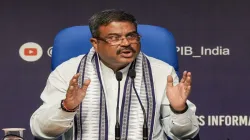Centre, UGC launch 'ASMITA' project to produce 22,000 books in Indian languages | DETAILS
By focusing on translation and academic writing, ASMITA aims to bridge the language gap in education, ensuring that students have access to high-quality study materials in their native languages.

The Ministry of Education and the University Grants Commission (UGC) on Tuesday unveiled a significant initiative aimed at bolstering the availability of educational resources in Indian languages. This ambitious project, named ASMITA (Augmenting Study Materials in Indian Languages through Translation and Academic Writing), aims to develop 22,000 books over the next five years. The launch event was attended by Sanjay Murthy, Secretary of Higher Education, who highlighted the project's potential impact on the educational landscape.
Key objective of ASMITA
ASMITA represents a joint effort between the UGC and the Bharatiya Bhasha Samiti, a high-powered committee established by the ministry. The primary objective of this initiative is to promote and integrate Indian languages more deeply into the education system, thereby enriching the learning experience and making it more inclusive. This project is seen as a part of a broader strategy to enhance the accessibility and quality of educational materials across various Indian languages.
What did Education Minister say?
"Launch of three landmark initiatives -- ASMITA, Bahubhasha Shabdkosh and Real-time Translation Architecture, will give momentum to imparting learning in Bharatiya Bhashas, empowering learners in their academic pursuits and preserving and promoting India's language traditions," Education Minister Dharmendra Pradhan wrote on X. He further added that these initiatives in line with the NEP will help create a comprehensive pool of academic resources in 22 scheduled languages, bridge the linguistic divide, foster social cohesion and unity, and also transform the country's youth into socially responsible global citizens.
UGC Chairman's view on this initiative
According to UGC Chairman Jagadesh Kumar, the project aims to create a robust ecosystem for translation and original book writing in Indian languages across various disciplines within higher education. "The goal is to produce 1,000 books in 22 languages within five years, resulting in 22,000 books in Bharatiya bhasha," Kumar said, as per news agency PTI.
Thirteen nodal universities have been identified to lead the project, along with member universities from various regions. "The UGC has also created a standard operating procedure (SOP) for the book-writing process in each assigned language. The SOP includes the identification of nodal officers, authors, allocation of title, subject and programme, writing and editing, submission of the manuscript, review and plagiarism check, finalisation, designing, proof-reading and e-publication," Kumar said.
'Bahubhasha Shabdakosh' launched by ministry
It should be noted here that the ministry also launched the "Bahubhasha Shabdakosh", a single-point reference for all the words in all Indian languages and their meanings. "This initiative will be developed by the Central Institute of Indian Languages (CIIL) in collaboration with the Bharatiya Bhasha Samiti. This Shabdakosh will help in using Bharatiya words, phrases and sentences for various new-age domains like IT, industry, research, and education," the UGC said in a statement.
ALSO READ: UGC asks colleges, and universities to prohibit unhealthy food in canteens